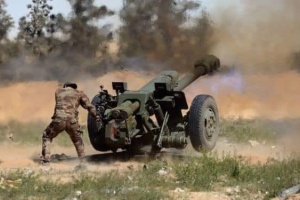By Abdullah Alkabir, Libyan political writer and commentator
Potential shifts in the Libyan crisis

The war in Sudan will have serious repercussions on the Libyan crisis, far more than Sudan’s other neighboring countries. Political stability enjoyed by these countries will leverage security threats, and will further confuse the US strategy in Libya, which seeks to form a joint armed force from the conflicting powers, and achieve a political consensus, conducive to elections before the end of the year.
The Sudanese war could lead to a security situation overshadowing the political one, thus decreasing focus on the election file.
All countries involved in the conflict will re-assess their roles, in line with regional developments. It is no longer enough to work on adapting one’s goals with the US ones, but rather regional tension resulting from the Sudanese war must be factored in.
It is within this context, comes the tour of the US envoy, Ambassador Richard Norland and his visits to Chad, and Congo. Securing the Libyan south through a local force to be formed in the light of the security nexus connecting Libya, Chad, and Sudan, as well as the complexities of the foreign fighters file in Libya, warrants cooperation of the Libyan-Sudanese neighbouring countries, because Libya's southern borders is area of movement for African armed groups, and base for operations of the Russian Wagner Groups in Africa.
It is expected that the Sudanese war will lead to an increase in the rates of irregular migration to Europe via the Libyan coast. Therefore, the Italian government invited Haftar to visit Rome, in clear contradiction with Meloni’s government policies towards Libya.
At the end of last year, the Italian prime minister visited Tripoli heading a large security and economic delegation, where she concluded an agreement with the Government of National Unity to develop gas production. A visit to the Libyan east was not included in her agenda, despite the presence of a parallel government mandated by the House of Representatives.
Dealing with institutions that derive their legitimacy from the political accord and ignoring anything else, reflects the bases upon which the Italian government deals with the Libyan file. In other words, consolidating relations with the Tripoli government.
However, the large increase in number of migrants during the first quarter of this year, compared to the same period last year, most of whom coming from eastern Libya, prompted the Italian government to change Its policies and open to Haftar. Italian Foreign Minister, Tajani, justified such shift by saying: "Haftar is the strongest in Cyrenaica, and it was right to talk to him about the migration phenomenon."
Although, this shift may not result in concluding a successful deal with Haftar, thereby reducing migration rates from Haftar's areas of influence, in return for supporting him to obtain more political gains and influence in Tripoli. This is because irregular migration activity appears to be run by Wagner groups beyond Haftar's control.
Italian Defense Minister, Guido Crosetto, accuses Wagner of waging a hybrid war against Italy. He recently stated: "It seems to me that it can be confirmed that the massive increase in migration rates emanating from the African coast is part of clear strategy of a hybrid war waged by Russia's Wagner, by exploiting its influence in some African countries."
Possible shifts in the policies of the countries involved in the Libyan conflict due to the war in Sudan prompted Dbeibah’s government to revive alliances with neighbouring countries close to Tripoli, with the visit of Foreign Minister, Najla Al-Mangoush to Tunisia and Algeria; two countries that have warm relations with the Dbeibah government, to confront any attempt to change the government, through a new political deal that could extend the transitional period.
The equilibrium between the local parties will not be severely off set due to the Sudanese conflagration, but it may drive the security file to the fore, by accelerating the formation of the joint force nominated to confront the Wagner in the south, in order to check Russian influence in Africa, reduce migration rates from the Libyan coast, and losing focus on the election file, with the declining interest of international powers, which have for long sought to exert pressure for consensus on election law, and then conduct elections before end of this year.
Disclaimer: The views and opinions expressed in this article are those of the writer, and do not necessarily reflect those of the Libya Observer



